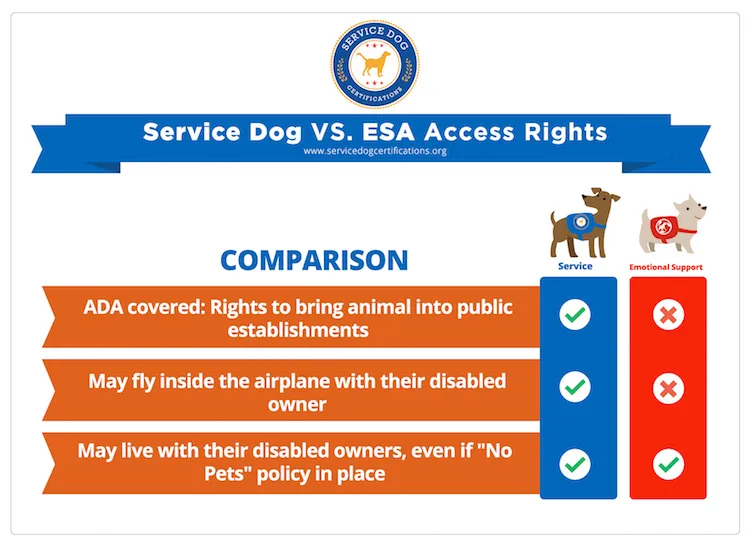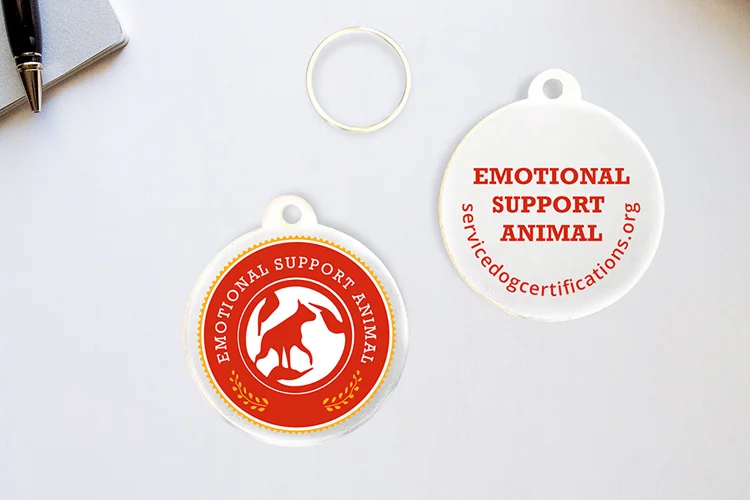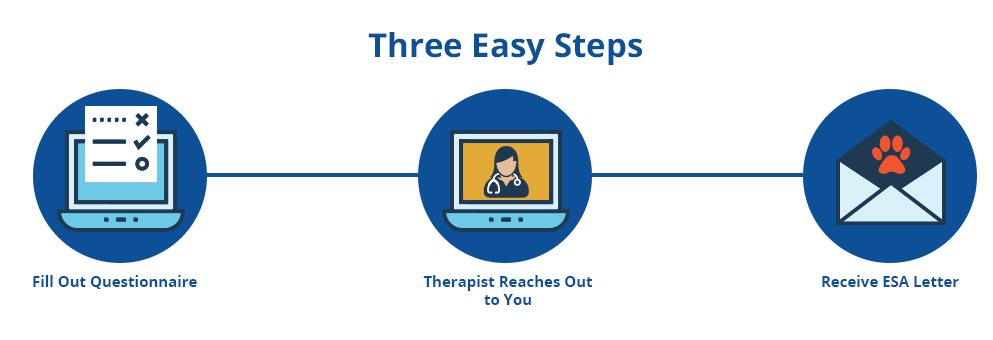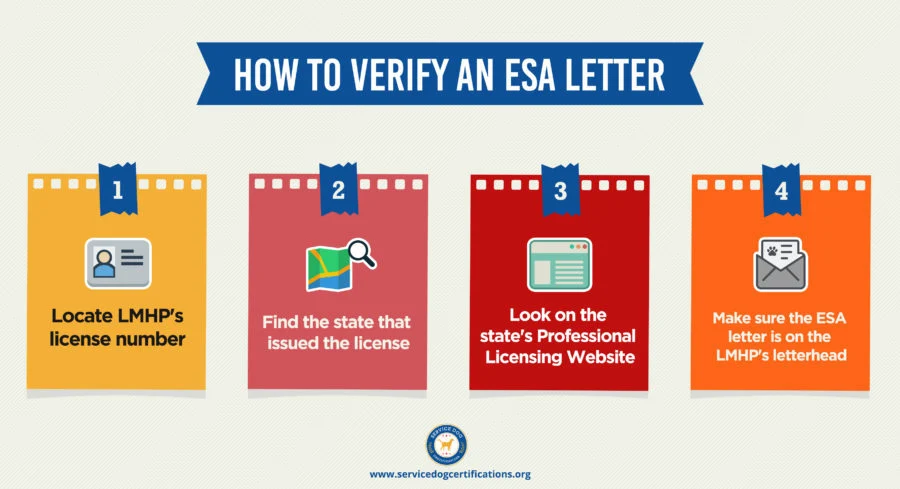How To Qualify for an Emotional Support Animal for Depression and Anxiety

Anyone who has a beloved animal in their life understands how pets can lift spirits and reduce loneliness. The Human-Animal Bond Research Institute (HABRI) states that 80% of pet owners attribute their reduced feelings of loneliness to their pets. The effect pets have on their owners makes an emotional support animal (ESA) vital to people who struggle with depression or anxiety. For those with emotional or mental health conditions, an ESA provides companionship and a soothing presence.
Although pets are beneficial for all pet owners, an emotional support animal is more than a pet; an ESA is a critical part of dealing with a mental illness. An ESA can have therapeutic value, and there’s a proven need for some people to have them near. An emotional support animal can be essential for someone dealing with depression and anxiety.

Depression
Depression is more than just feeling blue or sad. It’s the persistent feeling of hopelessness, sadness, and loss that remains with a person for longer than two weeks. The National Institutes of Health (NIH) states that depression can affect the quality of life and how a person eats, sleep, and works. Severe depression may even lead to suicide.
Symptoms of Depression
The symptoms of depression can be different from person to person. The following are signs that might be caused by depression:
- Constantly feeling sad, lonely, guilty, or hopeless
- Irritability, easy to anger
- Loss of enjoyment in things you used to like (hobbies and activities)
- Fatigue, lack of energy
- Talking or moving slow or feeling restless and anxious
- Difficulty making decisions or recalling words
- Difficulty concentrating or following a through on a task
- Sleep changes
- Aches and pains, digestive issues, and headaches that don’t seem to have a physical cause
- Thoughts of death or suicide

Anxiety
Stress is a common part of life. However, when a person experiences a large amount of stress for long periods, it can become anxiety. Anxiety comes in many forms, but it’s generally a heightened state of stress that doesn’t go away. Over time anxiety can get worse and affect work, school, and relationships. Some people may have Generalized Anxiety Disorder (GAD) or develop phobias like a fear of flying or cramped spaces. Anxiety, if left untreated, can cause significant distress and decrease a person’s quality of life.
Symptoms of Anxiety
The symptoms of anxiety, like depression, can vary from person to person. The following are some signs of anxiety:
- Feeling keyed-up, restless, and on edge
- Easily distracted or difficulty concentrating
- Irritable, easy to anger
- Muscle tension in the back, shoulders, or neck.
- Racing thoughts
- Difficulty staying or falling asleep
- Panic Attacks, which might include:
- Lound, pounding heartbeat
- Fast heart rate
- Profuse sweating
- Shaking or trembling
- Feeling chilly
- Shortness of breath, feeling smothered
- A sense of impending doom
- Feeling out of control

How an Emotional Support Animal Can Help Depression or Anxiety
Some people who have depression or anxiety may benefit from having a constant source of support that doesn’t judge them. An ESA can supply that base of warmth and connection and enable a person to function in their daily lives. The act of caring for an emotional support animal (feeding, grooming, walking, etc.) also encourages a person with depression or anxiety to maintain a schedule and participate in social activities. An ESA allows a person to have continuous affection and interaction.
How to get an ESA Letter Online
How To Qualify for an ESA If You Have Depression or Anxiety
If you suffer from the symptoms listed above, you may qualify for an emotional support animal. An ESA letter is required to establish whether you’re a suitable candidate for an ESA. If you are already seeing a licensed healthcare professional regarding depression or anxiety, you may want to consult with them regarding an ESA letter and incorporate an ESA into your treatment plan.
To own a legitimate ESA letter, the doctor or therapist must be licensed in your state of residence. If you’re unable to visit a doctor or your therapist is out of state, you can also get an ESA assessment online. A legitimate online service will connect you with a licensed healthcare professional licensed for your state.
Remember that an ESA must be written by a licensed healthcare professional, such as a psychologist, psychiatrist, nurse practitioner, or licensed clinical social worker (LCSW). If the author is not licensed, the letter is invalid. The ESA letter should include information regarding the licensed person, such as their name, license number, and contact information.
What the Law Says About Emotional Support Animals
The Department of Housing and Urban Development (HUD) states that a psychiatrist, physician, social worker, psychologists and other mental health professionals can write an ESA letter. Emotional support animals have the right to live in a “no pets allowed” housing and are protected by the federal law Fair Housing Act (FHA). Landlords can never charge any type of fee or deposit for tenants with emotional support animals, and they are not allowed to disallow an ESA because of its size or breed.
For people with depression or anxiety, an ESA doesn’t just brighten their day — an ESA can change their life.
See if you qualify for an Emotional Support Animal letter through ESA Doctors by clicking the link below.
About the Author: The writing team at Service Dog Certifications is made up of folks who really know their stuff when it comes to disability laws and assistance animals. Many of our writers and editors have service dogs themselves and share insights from their own experiences. All of us have a passion for disability rights and animals.
2 comments
Leave a Reply Cancel reply
Latest Posts

Dangerous Materials Hiding in Your Dog Products
Jake’s German Shepherd began developing strange rashes around his collar. Three vet visits later, they figured out the leather was treated with chromium — a chemical that irritates sensitive skin. Jake had no idea his dog’s collar contained industrial chemicals. Most dog owners don’t know what goes into the products they buy. Many companies use […]

Read More

Can You Bring a Service Dog to a Basketball Game?
Yes, you absolutely can bring your service dog to basketball games. Whether you’re heading to your local high school tournament, a packed college rivalry game, or splurging on NBA tickets, the Americans with Disabilities Act protects your right to be accompanied by your service dog anywhere the public can go. When you arrive, venue employees […]

Read More

Best Pet Health Insurance Providers
If you own a pet, you know how important — and expensive — vet care can be. One way to offset those costs is to purchase pet health insurance. Like typical health insurance, pet insurance is available at many price points, and can cover all, most, or only some of your vet-related costs. It can […]

Read More



My daughter has Anxiety and her doctor told her she is qualified to get a ESA. Her landlord called and said she is not disabled so she cannot get the ESA for the Home. Is this correct?
You can certainly qualify for an ESA with severe anxiety. A licensed healthcare professional has to agree that your condition meets the criteria for being a disability, which means a condition that substantially impairs a major life activity.